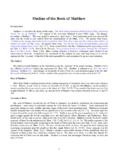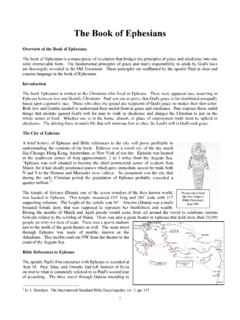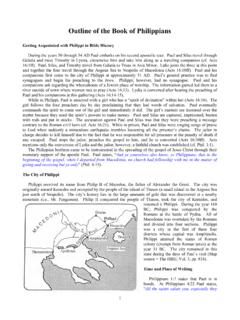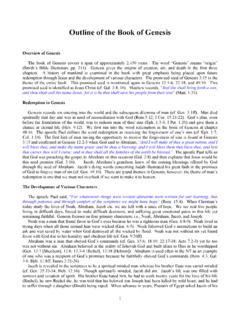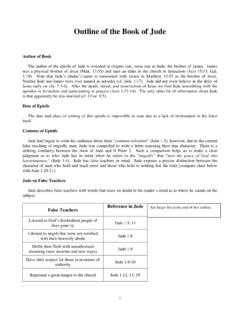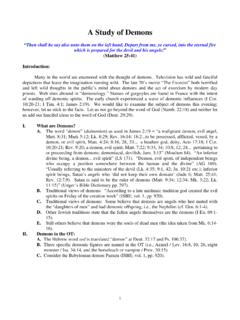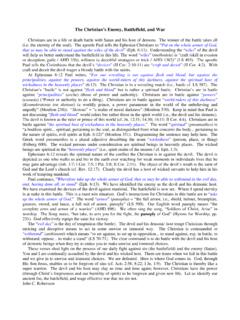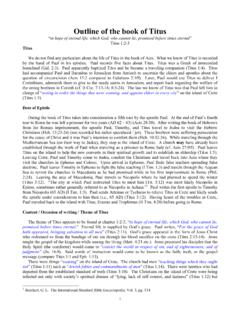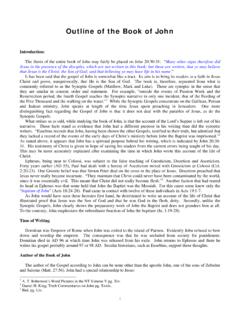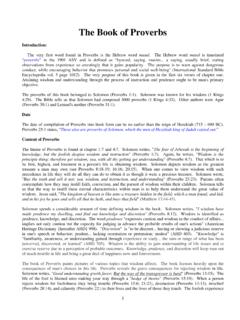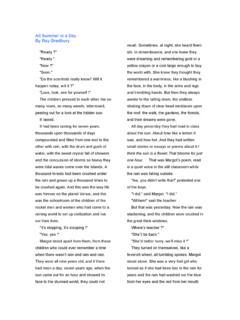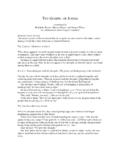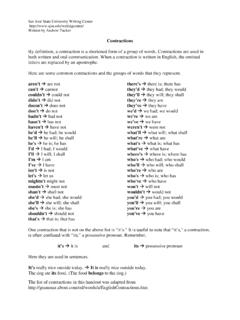Transcription of Outline of the Book of Zechariah - Floral Heights …
1 1 Outline of the book of Zechariah Zechariah Zechariah was a prophet of a priestly lineage who had returned to Jerusalem with Zerubbabel that the temple of Jehovah may be built (cf. Neh. 12:1-4, 16). Zechariah was an existing prophet of the day with Haggai and shared the same general purpose; , motivate the people to get busy and build the temple (Hag. 1:8; Zech. 4:9; 8:9). Date of Zechariah God sends the prophets Haggai and Zechariah to His people to motivate them to return to the work of building His temple (Ezra 5:1ff). Fifteen years would pass before any additional work on Jehovah s temple would resume (cf.)
2 Compare Ezra 4:24 to 6:1ff). Ezra 5:1-2 reveals that Haggai entered upon his work on the first day of the sixth month, in the second year of Darius. Zechariah began his work two months after Haggai (compare Hag. 1:1 and Zech. 1:1). This dates the book to the second year of Darius the king ( , 519 BC). The last oracle of Haggai to God s people is dated the ninth month of the second year of Darius ( , 519 BC) whereas Zechariah went on another two years to reveal the visions and oracles of God to the people (Zech. 7:1). The Message of Zechariah The message Zechariah takes into consideration the book of Haggai.
3 Haggai s message was that God s blessings of rain and fruitful earth have been withheld from the people due to the temple lying in ruins (cf. Hag. 1:7-11). God had commanded the temple to be built; however, the people, in disobedience, neglected this task (cf. Ezra 1:1-2; 6:14). The last words of Haggai take place in the ninth month of the second year of Darius (Hag. 2:20). The people had begun the work of the temple (cf. Hag. 1:14ff); however, the blessings of rain and fruitful ground continued to be withheld from them due to their disobedience in other areas (cf. Hag. 2:15-17). Zechariah reveals things about the state of God s people in Judea at this time that Haggai leaves out.
4 Five months after the people had begun the work on the temple of God (compare Zech. 1:7 with Haggai 1:15) Zechariah is pleading with them to return ye now from your evil ways (Zech. 1:4) because of their wickedness (Zech. 5:5-7). The people s obedience came in the form of mundane, mechanical, ritualistic or habitual religious practices (cf. Zech. 7:1-7). While thinking that their spiritual practices were acceptable, God reveals that their hearts were as hard as an adamant stone (Zech. 7:12). The people devised evil against their own brethren (Zech. 7:8ff), were unclean (Hag.)
5 2:14), and placed their trust in false prophets (Zech. 10:2). The message to the people was that if they wanted God s blessings they would have to not only build the temple but speak truth, execute truthful judgment, leave off evil devising, turn away from false oaths, and stop doing all the things that Jehovah hates (cf. Zech. 8:16-18). Zechariah delivers eight divine visions and two oracles to the people to effectively turn the people s hearts back to Jehovah. The thrust of the visions and oracles is that God s blessings are contingent upon man s obedience from the heart. Zechariah takes his audience down a future road of a day and time when the Branch or Messiah would reign as king supreme over God s kingdom (cf.
6 Zech. 3:6-8; 9:9). This King shall provide a fountain (Zech. 13:1) from his pierced body (Zech. 12:10) that God s people may be cleansed of their sins (Zech. 13:1). These living waters (Zech. 14:8) shall ever be supplied by the King over all the earth (Zech. 14:9). Application One must remember that Zechariah is addressing a people who have returned to the work of the temple yet once again faltered in this task. This fact is made apparent by the remarks of the prophet at Zechariah 4:6-9 and 8:9. The prophet encourages them to build even though it may seem like a small thing (cf.
7 Zech. 4:10). Again, 2 building the temple was a commandment of Jehovah s (cf. Ezra 1:1-2; 6:14). Zechariah reminds them that the blessings of God have been withheld from them due to their disobedience (cf. Zech. 8:9-13). The message of the prophet is that the people ought to learn that all of God s blessings are contingent upon their obedience. The prophet solidifies this idea with the use of the word rain at Zechariah 14:17. Those who obey God will worship him in hope of receiving the fountain (Zech. 13:1) of living waters (Zech. 14:8) that cleans man of sins (Zech. 13:1). The blessing of the forgiveness of sins is compared to the blessings of rain.
8 When the people s hearts were right and they built the temple out of a spirit of faith then the rains would return (cf. Zehc. 10:1). Likewise, today, when man obeys from a heart of faith they will receive God s blessing of the forgiveness of sins (cf. Eph. 1:3-7). Such a blessing can scarcely be overlooked by man. We need the forgiveness of sins far more than rain, food, lodging, money, entertainment, and emotional well being. No possible price can be placed upon the forgiveness of sins. Zechariah teaches us the value of God s blessings and the mode in which I am to obtain them. God wants us to obey Him out of a heart of love and spirit of gratefulness.
9 We too ought to build out of a spirit of obedience; however, let us never forget that if our actions of obedience are not motivated by faith and gratefulness then God does not accept it (Zech. 7:11-14). Chapter 1 I. A Call to the disobedient to take assessment of their current State (1:1-6): A. In the eighth month, in the second year of Darius, came the word of Jehovah unto Zechariah the son of Berechiah, the son of Iddo, the prophet, saying, Jehovah was sore displeased with your fathers. Therefore say thou unto them, Thus saith Jehovah of hosts: Return unto me, saith Jehovah of hosts, and I will return unto you, saith Jehovah of hosts.
10 Be ye not as your fathers, unto whom the former prophets cried, saying, Thus saith Jehovah hosts, Return ye now from your evil ways, and from your evil doings: but they did not hear, nor hearken unto me, saith Jehovah (1:1-4). 1. The priestly heritage of Zechariah is discussed in the introduction. 2. Let us recall some thoughts that a study of Haggai brings out: a. The 50,000 returning captives under Zerubbabel were commanded to rebuild the temple of Jehovah (cf. Ezra 6:14). b. The Samaritans; however, discourage the people and for 15 years the temple lays waste (cf. compare Ezra 4:24 to 6:1ff / Hag.)
